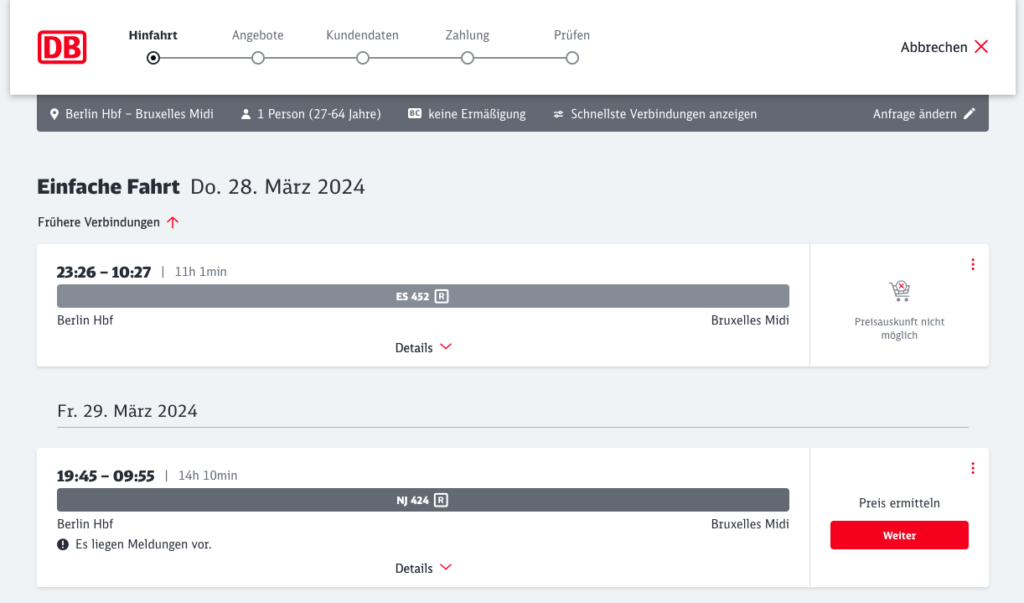It was in the news this week that night train startup European Sleeper has contacted the Bundeskartellamt (Federal Cartel Office) in Germany over Deutsche Bahn’s refusal to sell its tickets on bahn.de and in its DB Navigator app. I can see European Sleeper’s point of view very clearly here – the easier it is to book tickets, the more tickets the firm will sell.
This screenshot shows the situation on bahn.de – European Sleeper times are shown, while with a click-through it is possible to get prices for the Nightjet night train that DB runs in cooperation with ÖBB, shown second here:
European Sleeper crosses 4 countries (BE, NL, DE, CZ) – the international website of Dutch state railway company NS does not sell its tickets. However Belgian state owned railway SNCB does sell European Sleeper tickets on its international portal b-europe.com, as does Czech state owned operator ČD (that also is a partner in operations in Czechia – something SNCB is not in Belgium) – click screenshot to enlarge:
But is the behaviour of Deutsche Bahn and NS justifiable here?
Let’s take a step back a moment. The crucial point here when you look at this from the ticketing point of view is that passengers need to have the opportunity to book tickets for all trains, Europe wide, on the same platform or platforms. No more finding times in one place, and booking somewhere else.
But I am neutral as to whether DB or some other company – be they state owned or private – were to build such platforms.
However part of the reason why DB Navigator is so pre-eminent in Germany is because all the alternatives have such major shortcomings (more about this here), and – importantly – it is Deutsche Bahn’s behaviour that a core reason for these shortcomings of other platforms. The terms on which Deutsche Bahn will let others sell its tickets are poor, and Deutsche Bahn will not allow anyone else access to live running data of its trains – and two ticket selling platforms (Omio and Trainline) have complained to the Bundeskartellamt about these two issues.
So what is the solution?
Were European Sleeper’s argument to win out, that means Deutsche Bahn would have to sell everything on its website and in DB Navigator. DB might not fear European Sleeper, but it sure as hell fears Flixtrain – and it sees European Sleeper as the thin end of the wedge. Go down that route and you end up with DB being a quasi-monopoly player in route planning, ticket sales and live running data starting or ending in Germany.
Alternatively were the Omio and Trainline argument to win out (and indeed the EU finally to get its act together and agree a Multi Modal Digital Mobility Services Regulation (MDMS) – more about this in a report I wrote for Jakop Dalunde MEP here, PDF), then the issue is reversed – Deutsche Bahn, and indeed NS as well (that does not allow third parties to sell its cheapest tickets) – would not be able to restrict the development of alternative ticket sales platforms.
The problem here is that – at the moment – Deutsche Bahn wants to have it both ways. It wants to both keep the likes of European Sleeper and Flixtrain off its site and DB Navigator for ticket sales, and limit the development of alternative ticket platforms that would be all too happy to sell whatever company’s tickets, providing the resale terms were fair and reasonable.
Putting it another way, Deutsche Bahn’s position is obviously wrong, and ought to untenable. But that does not necessarily make European Sleeper’s argument right, because better data access for ticketing platforms would mean we would not all have to rely on DB Navigator as much as we do right now – allowing its rivals could also then succeed, and sell tickets from European Sleeper, DB and whoever else.



FWIW, sbb.ch shows the ES, but states clearly that they can not sell tickets (whereas DB claims that they can not show prices); OTOH, the NJ is shown, and tickets can be bought via the site.
Methinks SBB is clearer and fairer with the communication.
It would be nice if they would show a link to the operator.